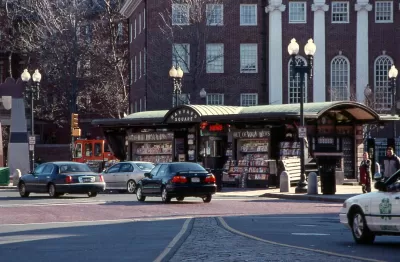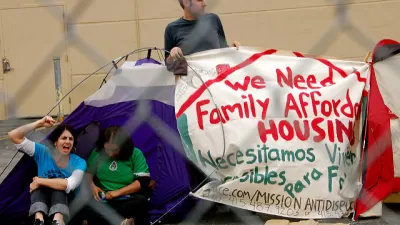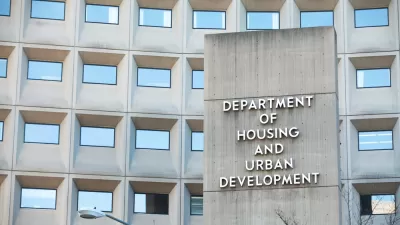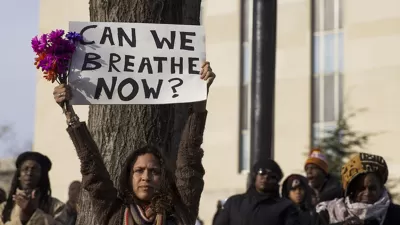At an annual gathering of land use journalists, we came away with more questions than answers about how the Trump administration will treat cities.

The best bathroom graffiti I encountered while attending the Lincoln Institute of Land Policy’s annual Journalists Forum this weekend in Cambridge, Mass., was "Donald Trump listens to Nickelback." Sick burn, right?
Plenty of journalists and commentators, myself included, have expressed similar, if less concise sentiments as we have speculated on the fate of cities under the Trump administration. The speculation continued at this weekend’s Lincoln Institute of Land Policy Journalists Forum, where colleagues and I discussed the heady theme of "Cities and Equity in the Era of the Trump Presidency."
All indications, from Trump’s anti-elite campaign rhetoric to his rural voter base to his bizarre choice of Dr. Ben Carson as HUD secretary, suggest that cities stand to suffer. They’ll suffer from both unfriendly policies and stingy funding, of everything from housing to infrastructure to the arts. Cities’ best hope lies in the administration’s general incompetence and Carson’s odd brand of cluelessness.
I think we’re all tired of making predictions, though. The Trump administration has set up shop and has had plenty of time to formulate its urban policy, however distressing it may be, right?
This was the promise—however optimistic—of this year’s edition of the forum. It’s an essential topic, of course. The country’s 100 largest metropolitan areas may dominate the country demographically, and they may generate the vast majority of the counters' wealth, innovation, and culture—accounting for 75 percent of GDP—but they are still tied, for better and worse, to Washington, D.C.
In the course of two days and nearly a dozen sessions—which included everyone from obscure policy wonks to big names like scholar Richard Florida, former Philadelphia Mayor Michael Nutter, and—ahem—Carson’s predecessor, Julian Castro, not a single representative of, surrogate for, or even defender of the Trump administration took to the podium.
Both in sessions and in conversation with me, forum organizer Anthony Flint advised that he and his staff took great pains to invite speakers from the Trump administration. Clearly exasperated, Flint referred to emails, phone calls, and everything short of bribery to get someone authoritative to show up. No dice. We thus ended up with the sort of disclaimer that every journalist knows well, "So-and-So did not respond to repeated requests to comment for this story."
Come to think of it, though, maybe Jared Kushner didn’t mean to show up in Iraq last week looking like a misplaced preppy idiot who confused the firing range for the driving range. Maybe he was supposed to speak to us, where, as a Harvard grad, he’d merely be a preppy idiot.
(My own most memorable experience with shy sources was, not coincidentally, an article involving the Tea Party a few years back.)
Had the conference taken place in Washington—as it did last year, a mere two blocks from Trump’s (occasional) residence—maybe we could have taken a field trip, all donning trench coats and fedoras, to do a stakeout in the bushes in front of Carson’s house. Indeed, Cambridge is probably the last place that a Trump supporter would want to be found.
That goes for speakers and audience members alike.
It turns out that Cambridge isn’t so unlike, Phoenix, Cleveland, El Paso, Des Moines, or San Diego—to name a few of the two-dozen or so cities represented at the forum. Demographically and culturally speaking, urbanism-plus-journalism-plus-Cambridge is a recipe for a room that leans well to the left.
Suffice it to say, Breitbart News did not attend. Though, as was pointed out in one session, alt-right sites like Breitbart and Infowars more web traffic than do all but the largest daily newspapers. “News” items about Hillary Clinton’s prostitution ring probably got more hits than any story any of us have ever written.
We discussed, with abundant anxiety, topics including policies towards sanctuary cities (and the definition thereof); the vaunted $1 trillion infrastructure plan, which may or may not be a Trojan horse for irresponsible privatization; funding for housing programs; support not only for mitigation of climate change but also for adaptation to climate change; and much more.
At every turn, both in official remarks, discussions among panelists, and dinner-table banter, a consistent attitude prevailed. Our collective disdain for Trump was evident and unapologetic. References to the administration's incompetence and incoherence drew chuckles. Dire predictions drew groans. Remarks that sounded like Louis C.K. tweets or quotations from Women’s March signs drew outright laughter.
And why shouldn’t they? As professionals, we are objective. Many of us in the room, which included full-time land use journalists as well as generalists like real estate reporters and metro beat writers—have covered Trump-related news with the restraint, objectivity, and balance that it deserves. But we’re only human. I, for one, am proud of my convictions and proud of my values. I imagine my colleagues are too. If nothing else, even conservative journalists respect the primacy of facts.
It’s not that the media is "liberal.” We’re just thoughtful, probing, and literate. And we’re not necessarily pro-urban. It’s just that we know firsthand that cities are not cauldrons of crime and carnage. We pay attention to data too.
On the very same day that we were meeting, the New York Times’ David Brooks wrote, "Trump’s greatest achievements are in the field of ignorance...Trump’s ignorance is not just an absence; it is a rich, intricate and entirely separate universe of negative information, a sort of fertile intellectual antimatter with its own gravitational pull." This from someone who casts himself as a professional centrist.
I’m also proud to live in a progressive, urban area (Los Angeles). I reject the derisive, self-flagellating term "bubble." Sure, cities may geographically seem like they are floating in oceans of sincere folksiness. But I’d hardly consider a city with 100 native languages, nonstop flights to 155 destinations, economic ties to probably half the world’s free countries, and ready embrace of pretty much every idea and culture you can imagine to be a "bubble." I mean, we’re not the ones who want to build a wall.
And yet, I want to have that discussion. As I said during one session, I felt deeply conflicted about being in such a politically homogenous group. I want to hear from thoughtful Trump supporters—at least from those who respect the basic premises of journalism—to feel their concerns. I want to understand—if not endorse—the policy solutions that they favor. I want to know what a Trump supporter understands, and misunderstands, about cities. I want to see what a discussion across ideologies and party lines can sound like.
I also want to discover opportunities for compromise and common ground. I know some of my friends will cringe at that. But, again, I’m talking about policy, not personality or ideology. Bear in mind, many, if not all, of the concerns of Trump supporters existed long before Trump anointed himself as their savior.
Barring this bipartisan meeting of the minds, many of us concluded that we need to keep doing what we’re doing. In may ways, local urban issues and, therefore, local urban coverage, will be more important than ever. We may not be able to institute enlightened immigration policies or create incentives for renewable energy, but we can, through objective coverage and thoughtful commentary, exhort and encourage cities to maintain their cultural, economic, and moral leadership. As ever, local issues affect Americans most directly, and, so far, local leaders haven’t lost their minds. Good journalists and good readers can help keep it that way.
The moral of the story is that we journalists must be vigilant and our cities must assert their own powers, make their own plans, and stick together. If we’re lucky, the Donald will turn up the Nickelback and leave cities alone.

Study: Maui’s Plan to Convert Vacation Rentals to Long-Term Housing Could Cause Nearly $1 Billion Economic Loss
The plan would reduce visitor accommodation by 25,% resulting in 1,900 jobs lost.

North Texas Transit Leaders Tout Benefits of TOD for Growing Region
At a summit focused on transit-oriented development, policymakers discussed how North Texas’ expanded light rail system can serve as a tool for economic growth.

Why Should We Subsidize Public Transportation?
Many public transit agencies face financial stress due to rising costs, declining fare revenue, and declining subsidies. Transit advocates must provide a strong business case for increasing public transit funding.

How to Make US Trains Faster
Changes to boarding platforms and a switch to electric trains could improve U.S. passenger rail service without the added cost of high-speed rail.

Columbia’s Revitalized ‘Loop’ Is a Hub for Local Entrepreneurs
A focus on small businesses is helping a commercial corridor in Columbia, Missouri thrive.

Invasive Insect Threatens Minnesota’s Ash Forests
The Emerald Ash Borer is a rapidly spreading invasive pest threatening Minnesota’s ash trees, and homeowners are encouraged to plant diverse replacement species, avoid moving ash firewood, and monitor for signs of infestation.
Urban Design for Planners 1: Software Tools
This six-course series explores essential urban design concepts using open source software and equips planners with the tools they need to participate fully in the urban design process.
Planning for Universal Design
Learn the tools for implementing Universal Design in planning regulations.
City of Santa Clarita
Ascent Environmental
Institute for Housing and Urban Development Studies (IHS)
City of Grandview
Harvard GSD Executive Education
Toledo-Lucas County Plan Commissions
Salt Lake City
NYU Wagner Graduate School of Public Service






























